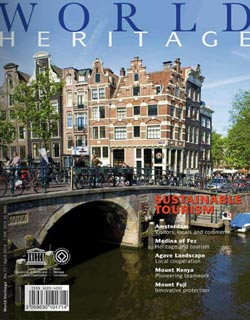Recent policy and conceptual developments in World Heritage, and in conservation generally, set the stage for new approaches that engage indigenous and local communities in World Heritage. The inclusion of communities as one of the five Strategic Objectives in the World Heritage Convention reflects an increasing demand for community engagement at all stages of the World Heritage process, and for rights-based approaches that link conservation and sustainable development.
A new addition to the World Heritage Papers series provides guidance and introduces tools for best practice in engaging indigenous and local communities in World Heritage. Engaging Local Communities in Stewardship of World Heritage draws on over a decade of experience of the Community Management of Protected Areas for Conservation (COMPACT) initiative at eight natural World Heritage Sites in countries of Africa, Latin America, the Caribbean and Asia, and on emerging experience at two new sites.
COMPACT thus far has been a joint initiative of the UNDP-implemented Global Environmental Facility Small Grants Programme (SGP) and the United Nations Foundation, with partners including the UNESCO World Heritage Centre. COMPACT has developed an innovative model for engaging communities in conservation and shared governance of World Heritage sites and other globally significant protected areas. It offers a unique example of best practice in this area, tested at site-level in eight very different settings representing a variety of geographic regions. Recognizing its potential value for other World Heritage sites, SGP and the UNESCO World Heritage Centre are now collaborating on a series of activities to support replication and/or adaptation of the COMPACT model in new sites, including a number of World Heritage sites in Africa.
This publication provides guidelines, illustrated with case-studies. Recognizing the importance of community engagement throughout the life of a World Heritage site, it considers all stages of the World Heritage process. It reflects on lessons learned, discusses the application of the methodology in new settings and offers recommendations going forward.
World Heritage Paper 40 was launched in mid-November 2014 at the World Parks Congress in Sydney, Australia. This publication was prepared in collaboration with the UNDP/GEF Small Grants Programme and was made possible thanks to the generous support of the Government of Spain (AECID) and the Ministry of Education, Culture and Science of the Netherlands.










